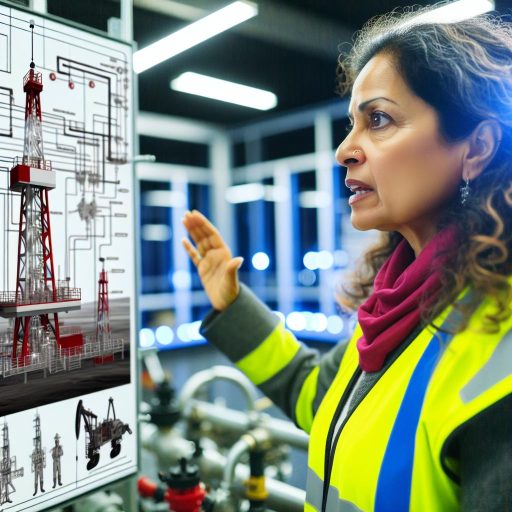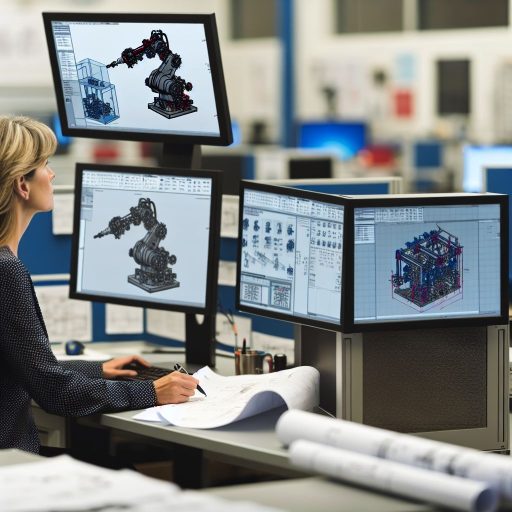Overview of the Aerospace Engineering Field
Definition of Aerospace Engineering
Aerospace engineering focuses on the design and development of aircraft and spacecraft.
This field encompasses various disciplines, including aerodynamics and avionics.
Aerospace engineers work on systems that operate within Earth’s atmosphere and beyond.
Additionally, they ensure that these systems meet strict safety and performance criteria.
Scope of Aerospace Engineering
The scope of aerospace engineering is vast and continually evolving.
It includes the study of propulsion systems, materials, and structural mechanics.
Furthermore, aerospace engineers analyze the effects of flight on design and functionality.
They also develop advanced technologies like unmanned aerial vehicles and space exploration vehicles.
Key Areas of Aerospace Engineering
- Aircraft Design
- Spacecraft Systems
- Propulsion Technology
- Control Systems
- Aerodynamic Analysis
Collaboration in the Field
Aerospace engineers often collaborate with scientists and technologists.
This teamwork promotes innovation and improvement in aerospace technology.
Additionally, engineers frequently partner with government agencies and private companies.
Such collaborations lead to advancements in research, development, and production.
Current Trends in Aerospace Engineering Job Market
Industry Growth and Demand
The aerospace engineering sector is experiencing rapid growth.
New technologies, such as electric aircraft, drive demand.
Moreover, the increasing need for military and defense solutions boosts job opportunities.
Companies like SkyTech Innovations are hiring more engineers across various specialties.
Emerging Specializations
Aerospace engineering now features several new specializations.
For instance, satellite technology has become a critical field.
This area focuses on designing and launching communication satellites.
Additionally, unmanned aerial vehicles (UAVs) are gaining significance.
Engineers specializing in drone technology will find abundant opportunities.
Impact of Sustainability Initiatives
Sustainability is a major focus within the aerospace industry.
Companies strive to reduce carbon footprints and enhance fuel efficiency.
As a result, engineers with expertise in green technologies are in high demand.
For example, Boeing is investing in sustainable aviation fuels.
Unlock Your Career Potential
Visualize a clear path to success with our tailored Career Consulting service. Personalized insights in just 1-3 days.
Get StartedThese initiatives create job openings for engineers passionate about environmental issues.
Technological Advancements and Skills
Advanced technologies transform traditional aerospace roles.
Skills in artificial intelligence and machine learning are increasingly valuable.
Engineers who can integrate these technologies into aerospace applications are sought after.
Furthermore, proficiency in computer-aided design (CAD) software remains essential.
Overall, continuous learning will empower engineers to adapt to these changes.
Global Opportunities and Remote Work
The aerospace job market now extends beyond borders.
International collaborations offer engineers broader career paths.
Moreover, remote work options continue to rise within the industry.
Companies recognize the effectiveness of remote teams in certain roles.
This shift enables professionals to work from diverse locations around the world.
Key Skills Required for a Career in Aerospace Engineering
Technical Proficiency
Understanding aerodynamics is crucial for aerospace engineers.
They also need to grasp flight mechanics and propulsion systems.
In addition, knowledge of materials science enhances design capabilities.
Engineers must stay updated with the latest aerospace technologies.
Mathematical and Analytical Skills
Strong mathematical skills are essential for engineering calculations.
Analytical skills help in evaluating design performance and simulations.
Engineers often use statistical methods for data analysis.
Critical thinking plays a key role in problem-solving scenarios.
Communication Skills
Aerospace engineers must communicate effectively with teams.
Written documentation of designs and processes is vital.
Presenting ideas clearly to stakeholders is also important.
Collaboration with multidisciplinary teams enhances project success.
Project Management Abilities
Managing projects requires good organizational skills.
Engineers often lead teams, ensuring tasks are completed on time.
Budget management is also a critical part of project oversight.
Resource allocation ensures that all aspects of a project run smoothly.
Adaptability and Continuous Learning
The aerospace field regularly introduces new technologies.
Engineers must be adaptable to stay relevant in the industry.
Continuous learning is key to maintaining professional competence.
Attending workshops and seminars can enhance skill sets.
See Related Content: Internship Tips for Aspiring Biomedical Engineers
Educational Pathways: Degrees and Certifications in Aerospace Engineering
Overview of Aerospace Engineering Education
Aerospace engineering offers diverse educational pathways.
Students can pursue various degrees to enter the field.
Understanding these options is vital for aspiring engineers.
Undergraduate Degrees
An undergraduate degree is often the first step.
Bachelor’s degrees in aerospace engineering are common.
Most programs cover essential engineering principles.
Students also learn about aerodynamics, propulsion, and materials.
Many universities offer accredited programs.
Accreditation ensures quality education and industry recognition.
Graduate Degrees
Graduate degrees can enhance career prospects.
A master’s degree allows for specialization in aerospace fields.
Popular concentrations include avionics, propulsion, and structures.
Research opportunities often exist at this level.
Many engineering firms seek advanced-degree holders.
Certifications
Certifications can further solidify expertise in aerospace engineering.
Professional certifications indicate a commitment to the profession.
The American Institute of Aeronautics and Astronautics (AIAA) offers relevant options.
Other organizations provide specialized certifications as well.
These credentials can enhance job competitiveness.
Continuing Education
Continuing education is crucial for staying relevant.
Aerospace technology evolves rapidly.
Engineers should pursue workshops and seminars regularly.
Online courses also provide flexibility for learning new skills.
Staying informed about industry trends is essential.
Networking and Professional Development
Networking plays a key role in career advancement.
Professional organizations facilitate connections among engineers.
Attending conferences can provide valuable insights.
Additionally, mentorship opportunities can guide newer engineers.
Building a professional network opens doors to job opportunities.
Uncover the Details: Job Hunting Tips for Petroleum Engineers in Canada
Top Industries Hiring Aerospace Engineers
Aerospace Industry
The aerospace industry remains a primary employer for aerospace engineers.
Companies like Boeing and Lockheed Martin consistently seek skilled talent.
Aerospace engineers design and develop aircraft and spacecraft.
Additionally, they often focus on improving safety and efficiency standards.
Furthermore, the demand for advanced technologies drives job creation in this field.
Defense Sector
The defense sector relies heavily on aerospace engineers for national security.
Organizations such as Northrop Grumman and Raytheon require specialized expertise.
Engineers work on military aircraft, drones, and missile systems.
This sector offers dynamic and often challenging job opportunities.
Moreover, engineers in this field contribute to innovative defense strategies.
Commercial Aviation
Commercial aviation increasingly hires aerospace engineers to enhance passenger safety.
Airlines like Delta and Southwest look for engineers to optimize fleet operations.
Engineers often focus on aircraft maintenance and regulatory compliance.
This industry prioritizes fuel efficiency and sustainability improvements.
Additionally, the growth of air travel develops robust job openings.
Space Exploration
Space exploration presents unique opportunities for aerospace engineers.
Companies such as SpaceX and Blue Origin lead the charge in this sector.
Engineers contribute to the design of rockets and interplanetary missions.
This field fosters innovation and pushes technological boundaries.
Furthermore, collaboration with international space agencies opens additional pathways.
Automotive Sector
The automotive sector increasingly integrates aerospace engineering principles.
As electric vehicles gain popularity, companies like Tesla seek engineers.
Aerospace engineers help develop advanced systems for aerodynamics and materials.
This cross-industry collaboration is reshaping the future of transportation.
In addition, the demand for fuel-efficient designs drives new job roles.
You Might Also Like: Top Tools and Software for Chemical Engineers

Internship and Co-op Opportunities for Aerospace Engineering Students
Understanding the Importance of Internships
Internships offer practical experience in aerospace engineering.
They allow students to apply classroom knowledge in real-world settings.
Additionally, internships enhance resumes for future job applications.
Employers often prefer candidates with relevant work experience.
Types of Internship Opportunities
Several types of internships exist in aerospace engineering.
Manufacturing internships focus on aircraft production processes.
Design internships emphasize creating and testing new aerospace concepts.
Research internships involve working on cutting-edge technologies.
Operations internships often relate to project management roles.
Co-op Programs: A Different Approach
Many universities offer co-op programs for engineering students.
Co-ops typically combine academic study with full-time work experiences.
Students can alternate between periods of study and professional work.
This approach allows for deeper immersion in the field.
Moreover, co-ops help students forge professional networks.
Where to Find Opportunities
Many organizations actively recruit for internships and co-ops.
Companies like Boeing and Lockheed Martin often have programs.
NASA also provides various internships for aspiring engineers.
Furthermore, smaller firms may offer unique opportunities.
Online job boards and career fairs are excellent resources as well.
How to Secure an Internship or Co-op
Begin by preparing a strong resume tailored to aerospace engineering.
Include relevant coursework and any projects you’ve completed.
Next, practice your interview skills through mock interviews.
Networking can also play a crucial role in your search.
Attend industry events and connect with professionals on LinkedIn.
Maximizing Your Internship Experience
Once you secure an internship, set clear goals for yourself.
Be proactive in seeking out learning opportunities during your time.
Ask questions and seek feedback from supervisors and peers.
Lastly, maintain a professional attitude to leave a lasting impression.
Uncover the Details: Tips for Balancing Work and Life as a Petroleum Engineer
Networking and Professional Organizations for Aerospace Engineers
The Importance of Networking
Networking is crucial for aerospace engineers seeking career growth.
It opens doors to new opportunities and collaborations.
Building connections in the industry enhances your professional development.
Moreover, it helps you stay informed about industry trends.
Participation in networking events can be highly beneficial.
Key Professional Organizations
Several professional organizations cater specifically to aerospace engineers.
Joining these organizations can amplify your networking efforts.
Here are some notable organizations:
- The American Institute of Aeronautics and Astronautics (AIAA)
- The Society of Aerospace Engineers (SAE International)
- The International Astronautical Federation (IAF)
Participating in Events and Conferences
Attending industry events and conferences is highly advantageous.
These gatherings provide opportunities to meet industry leaders.
Furthermore, they often feature valuable workshops and sessions.
Make sure to participate actively during these events.
Engaging with speakers and attendees can lead to future collaborations.
Utilizing Online Networking Platforms
Online platforms can significantly expand your networking reach.
Websites like LinkedIn cater specifically to professionals.
Create a comprehensive profile to showcase your skills.
Join relevant groups and participate in discussions.
This approach allows you to connect with like-minded professionals.
Volunteering and Leadership Roles
Consider volunteering for aerospace engineering organizations.
Taking on leadership roles will enhance your visibility in the field.
Additionally, it demonstrates your commitment to the profession.
Volunteer opportunities often lead to valuable connections.
Regularly participating builds your reputation as a dedicated engineer.
Future Job Prospects: Innovations and Emerging Roles in Aerospace Engineering
Introduction to Future Opportunities
The aerospace engineering field is evolving rapidly.
Technological advancements drive the need for skilled professionals.
As a result, job prospects expand significantly.
Innovations Shaping the Aerospace Sector
The aerospace industry continually adapts to new technologies.
For instance, advancements in artificial intelligence enhance design processes.
Moreover, improvements in materials science lead to lighter, stronger components.
This creates more efficient aircraft and spacecraft.
Furthermore, the integration of automation streamlines manufacturing.
Emerging Roles in Aerospace Engineering
New job roles arise in response to these innovations.
Data analysts are increasingly essential for interpreting flight data.
Additionally, systems engineers ensure seamless integration of technologies.
Furthermore, sustainability experts focus on reducing environmental impacts.
These roles contribute to the industry’s response to global challenges.
Future Trends to Watch
Several trends may define the future of aerospace jobs.
Electric propulsion systems will likely gain traction.
This shift emphasizes the need for engineers specializing in battery technologies.
Moreover, urban air mobility will create demand for new aircraft designs.
Consequently, urban planners and aerospace engineers must collaborate closely.
The Importance of Continuous Learning
As technology evolves, professionals must adapt and learn.
Continuous education will become increasingly important.
Such training can include workshops, seminars, and advanced degrees.
Ultimately, staying ahead will ensure career resilience in aerospace.




